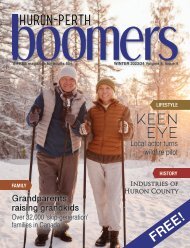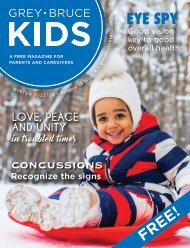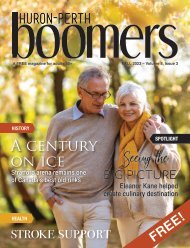Grey-Bruce Boomers Fall 2023
Create successful ePaper yourself
Turn your PDF publications into a flip-book with our unique Google optimized e-Paper software.
y Christine Feige<br />
Physical and mental health often take centre stage,<br />
however it’s equally important not to neglect your<br />
own hearing health. Your hearing connects you to<br />
the world, and preserving good hearing throughout<br />
your life is essential.<br />
How hearing occurs in the brain<br />
Hearing is a complex process that happens in the<br />
brain. Sound waves travel through the ear, and<br />
the brain processes them for comprehension. It’s<br />
important to note that hearing loss, whether caused<br />
by injury, illness, excessive sound exposure, or aging,<br />
can impact brain health, leading to an increased risk<br />
of cognitive decline. Additionally, it affects physical<br />
health by increasing the risk of falls and mental<br />
health by increasing the risk of depression and social<br />
isolation. Understanding the causes of hearing loss is<br />
essential to address the issue effectively.<br />
Clearing the pathway to the brain<br />
Cerumen impaction, or the build-up of earwax, can<br />
have significant effects on optimal hearing health.<br />
When earwax accumulates and blocks the ear canal,<br />
it can lead to symptoms such as decreased hearing<br />
sensitivity, muffled sounds, or even temporary hearing<br />
loss. This impaction not only hinders our ability to<br />
hear clearly but also increases the risk of developing<br />
other complications, such as ear infections or tinnitus.<br />
To ensure optimal hearing health, it’s crucial to<br />
address cerumen impaction promptly. Regular<br />
cleaning and maintenance of the ears by a hearing<br />
health care professional can help to maintain a clear<br />
pathway for sound to reach the inner ear. By taking<br />
proactive steps to manage cerumen impaction, you<br />
can safeguard your hearing abilities and promote<br />
overall optimal hearing health.<br />
Identify hearing loss<br />
Hearing loss can impact individuals of all ages, from<br />
HEALTH AND WELLNESS<br />
infants to older adults. It’s important to recognize the<br />
signs of hearing loss to ensure timely intervention<br />
and support. Detecting hearing loss in children can<br />
be challenging, as they may struggle to communicate<br />
their difficulties. However, there are signs to watch<br />
for, including:<br />
• Delayed language development.<br />
• Difficulty following directions.<br />
• Poor academic performance.<br />
• Inattentiveness or lack of response to sounds.<br />
• High volume when watching TV or listening<br />
to music.<br />
The signs and symptoms of hearing loss can vary<br />
among young adults and adults. Common indicators<br />
include:<br />
• Difficulty hearing conversations, especially in<br />
noisy environments.<br />
• Increasing volume on the TV or radio.<br />
• Frequent requests for repetition.<br />
• Ringing or buzzing in the ears (tinnitus).<br />
• Difficulty hearing high-pitched sounds.<br />
• Avoidance of social situations or withdrawal<br />
from conversations.<br />
Impact on daily life<br />
Hearing loss can significantly impact individuals<br />
of all ages. Untreated hearing loss in children<br />
can lead to difficulty understanding instructions,<br />
communicating with peers, and feelings of isolation.<br />
In teens and young adults, hearing loss can affect<br />
academic and social lives. For adults and older adults,<br />
it can affect communication with family and friends,<br />
job performance, and overall quality of life.<br />
Regardless of age, hearing loss may lead to social<br />
isolation, depression, and cognitive decline.<br />
Prevent hearing loss<br />
Preventing hearing loss is a collective effort that<br />
involves all family members. By being proactive and<br />
FALL <strong>2023</strong> • 11
















